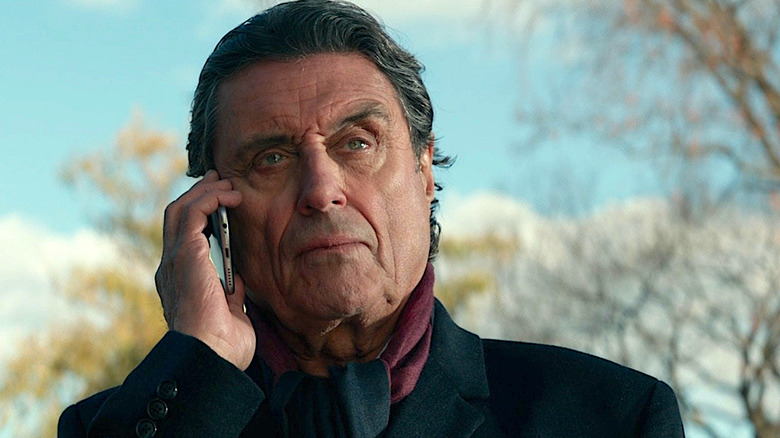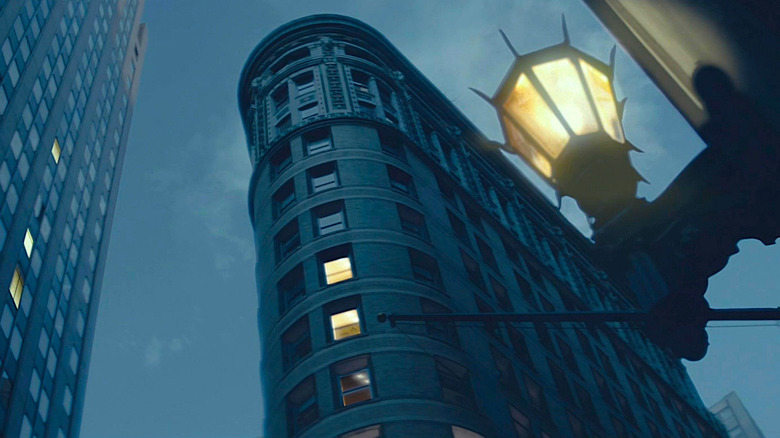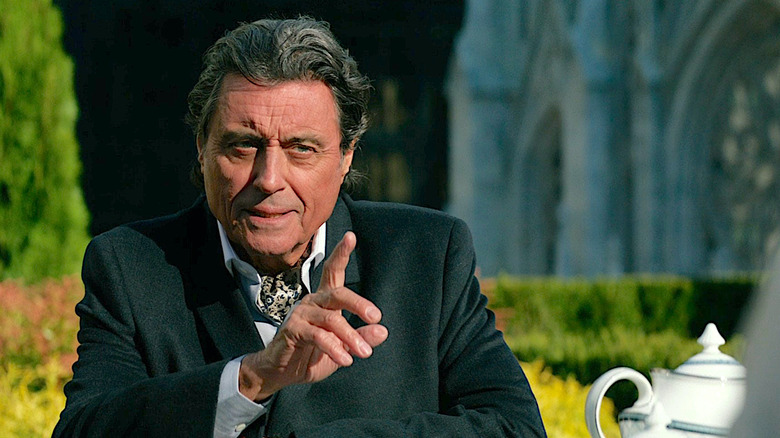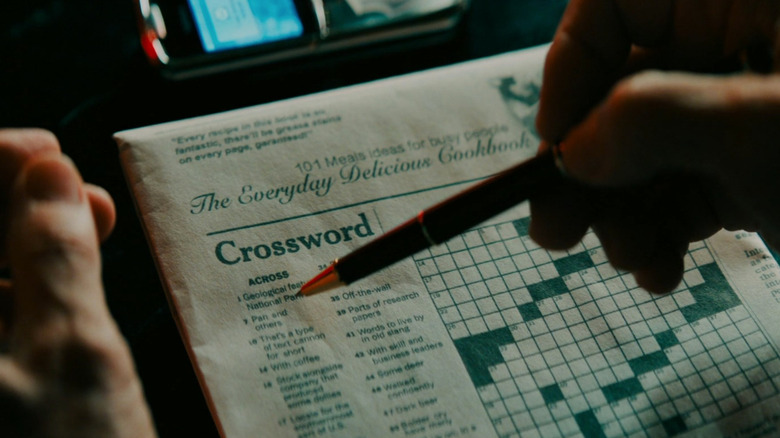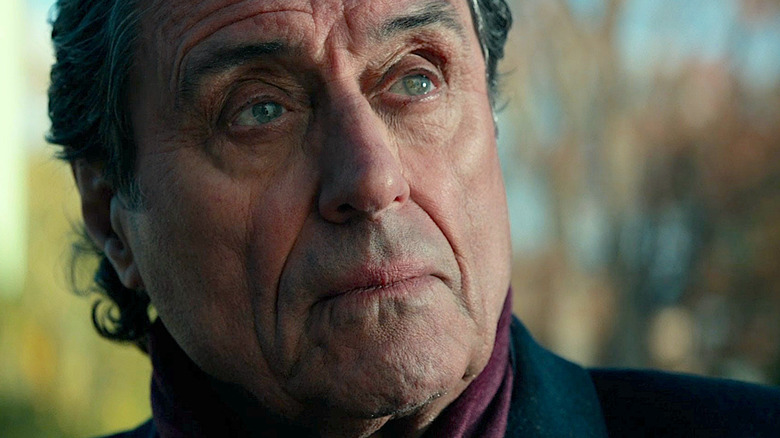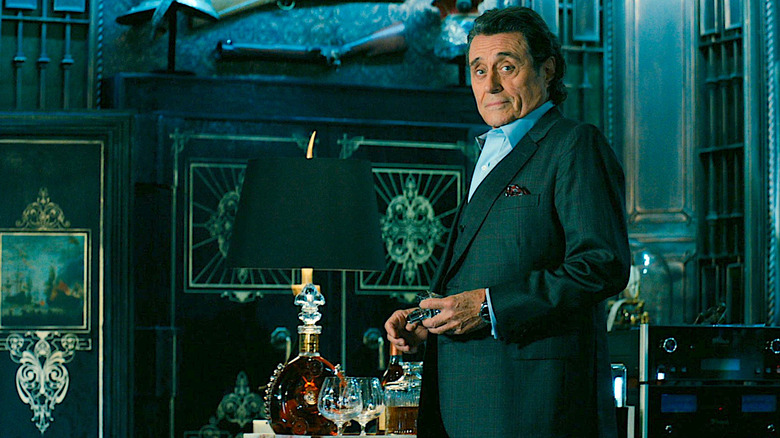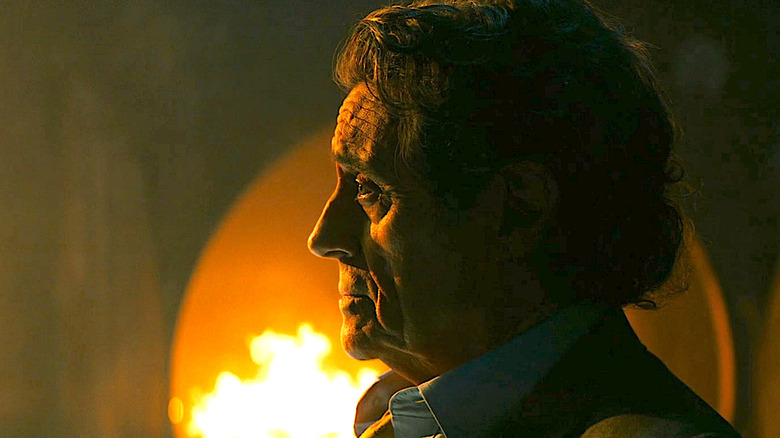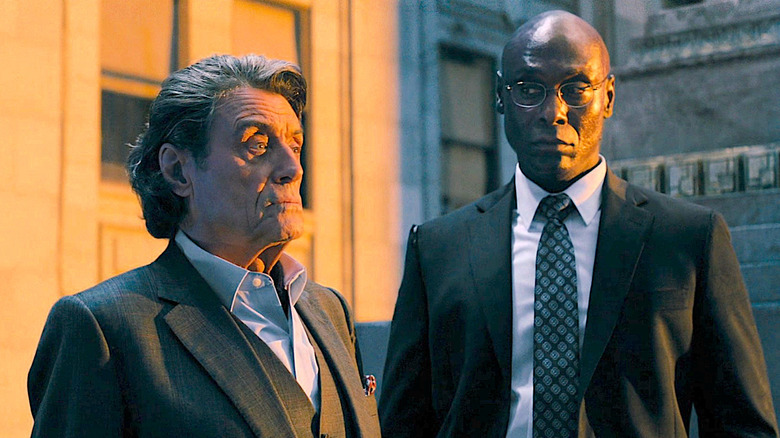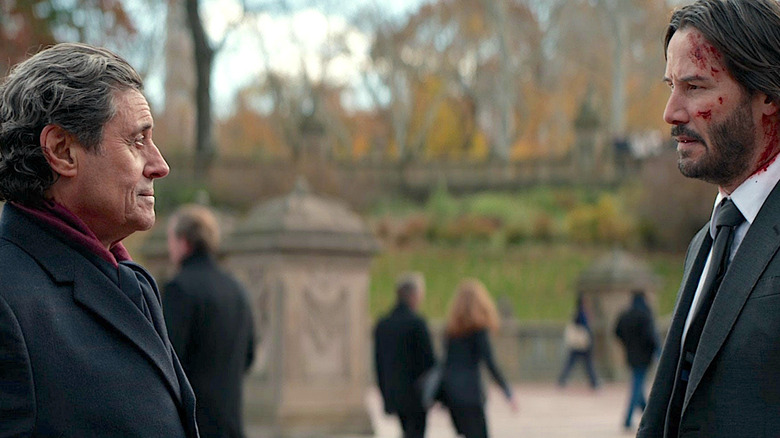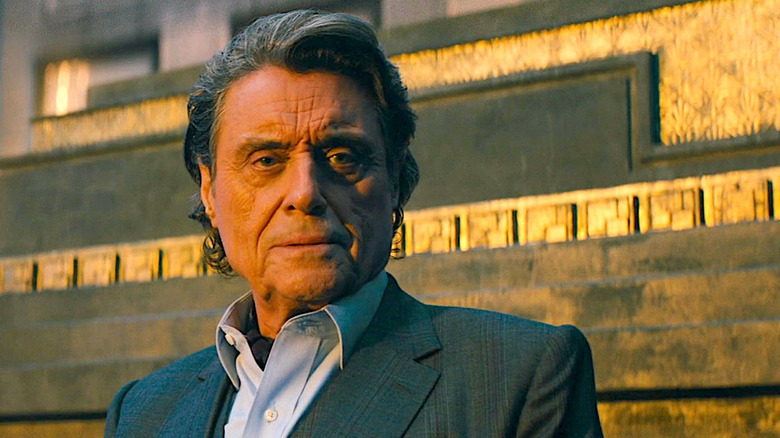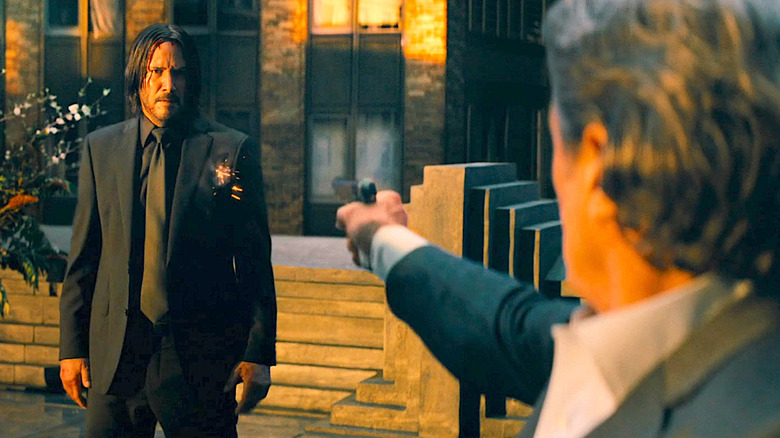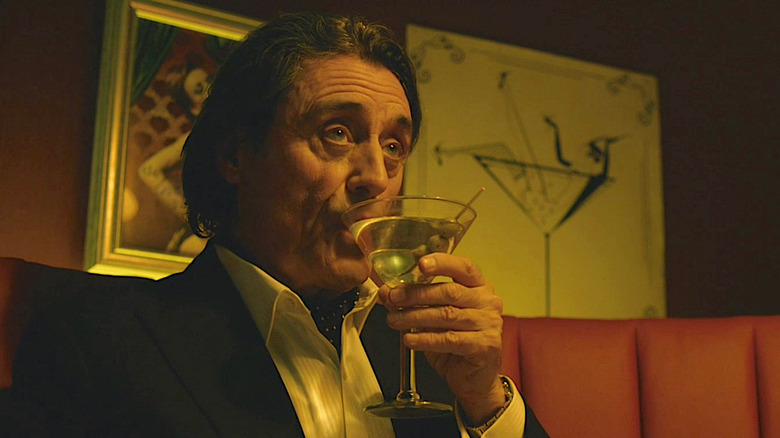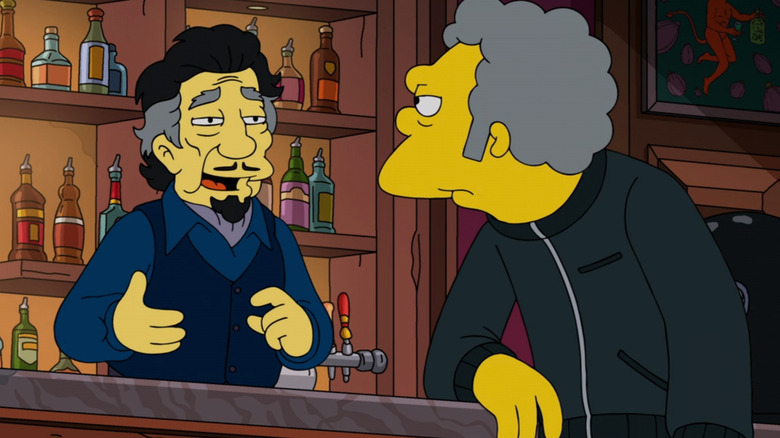Winston Scott: 12 Facts Only John Wick Fans Know About The Continental's Owner
Winston Scott is the mysterious manager of The Continental, a luxury hotel for high-end assassins that is at the center of the heightened reality of "John Wick." Winston is the silky, smoky, single-malt voice of reason in Wick's vengeful ear — even if Mr. Wick doesn't always listen. In a franchise that loves them, Winston is one of the criminal underworld's top dogs. He's John Wick's man in the van, if you switch out "van" for five-star underworld hotel.
Winston is a mainstay of the "John Wick" films, starting as a cameo-level character and building to major player status. Paternal and positively killer with a cravat, Winston is powerfully played by the superbly stylish Ian McShane. Notable for stage and screen, viewers may know McShane from his work in "Deadwood" and "American Gods."
Colin Wooddell is set to play young Winston in the 1970s-set "The Continental." The prequel miniseries promises to shed further light on Winston's shadowy past, but here are 12 (spoiler-heavy) facts only Wick fans already know about The Continental's proprietor.
He's nothing without his work
Winston is the manager of the New York City Continental, and the manager is always in. Winston relishes his line of work, whether inspecting the artistry that goes into making gold assassin coins or crafting a menu stocked with so many gourmet options that a member of the High Table could reside there for weeks without eating the same meal twice — providing he isn't executed before his first dessert. But even though Winston's taste is impeccable and his flair for service is unimpeachable, it isn't just a love of hospitality that keeps him around.
John Wick (Keanu Reeves) was married to Helen; Winston is married to his job. The movies never explicitly spell out why, but part of it must be the power his position affords. Part of it is his connection to Charon the Concierge (the late Lance Reddick), and a likely sense of home Winston finds within The Continental's well-appointed walls. Part of it seems tied to a commitment to find order in a chaotic landscape. In a world of blood and vengeance, Winston can provide weary assassins with a place to safely lay their heads for the night — all buoyed by the musical stylings of a lively jazz combo.
The Continental is Winston's domain. He may be beholden to the rules of the High Table, but here, consequence follows his lead — for awhile, anyway. Winston has been entwined with The Continental so long, he may not know who he is without it. Even when the hotel is de-consecrated and nearly destroyed, he stops at nothing to get The Continental — and his purpose — back.
He's a stickler for the rules
Winston knows rules are what "keeps us from living with the animals" — but that doesn't mean he won't bend them for his own benefit, or John Wick's. At the end of the first "John Wick" Winston punishes assassin Perkins for conducting "business" in the hotel. In "John Wick 2," Winston reminds John there are two rules that must never be broken: "No blood on Continental grounds and every marker must be honored."
Winston knows that the consequences for breaking the High Table's rules go beyond minor inconvenience. Even when Winston plays fast and loose with his own choices, he is always concerned with John's grief-stricken disregard for the consequences. Winston warns John to take off his revenge goggles and consider his situation clearly when Santino shows up to taunt John at The Continental. Of course, John doesn't listen.
When John shoots Santino in the head, he shoots himself in the foot. Winston is compelled to exile him from the safe haven of The Continental, as the Table's rule's dictate — but he also helps take an edge off the consequences. Winston gives John an hour head start on his "excommunicado" order, and a mysterious (and powerful) marker — a pledge to help John in some hour even more desperate than the present one. Winston might be big on order and consequence, but he's also bound by his own loyalties. Even if Winston follows the rules 90 percent of the time, 100 percent of the time he'll find a way to still follow his own heart.
The man's got a way with words
Whether he's acting as John's far more vocal voice of reason, attempting to talk down hotheaded High Table brats, or playing verbal chess with The Adjudicator, Winston can turn a phrase as well as John Wick can twist a bad guy's neck. Plus, he's multilingual, so he can spit wisdom in a variety of tongues — and really tear up a crossword puzzle.
Most of Winston's gift for gab is spent warning the fools around him against doing what fools cannot help but do — foolishness. He warns Santino of his own impending doom because he "stabbed the devil in the back and forced him back into the life he just left." Mere moments before she gets merced next to Bethesda Fountain, Winston warns Perkins that her membership to The Continental has been, "by thine own hand, revoked." He even tries to warn his beloved "Jonathan" away from coming back into the fold in the first "John Wick," asking if he's considered the gravity of the situation — has he "chewed down to the bone?"
Winston doesn't need to spill a lot of words to get his point across, even though he enjoys a pithy phrase as much as he does a three-olive martini. Sometimes, Winston merely lets his significant eyebrows do his talking for him. A picture may be worth a thousand words, but one of Ian McShane's arched eyebrows has to be worth a million.
He knows how to win friends and influence people
Though Winston's background is purposely kept mysterious, and likely still will be even after "The Continental" miniseries airs. Winston's warmth, charm, and networking skills get him far, and a possible fear of his wrath might have gotten him even farther. Whatever the real reason is for Winston's influence, the fact that he has it is undeniable — who else could buy time on an "ex-communicado" order or be comfortable with the idea of "skirmishing" with the High Table?
In addition to Winston's obviously tight bonds with John and Charon, he's on underworld-boating basis with the Bowery King. He's buds with the man who mints gold coins, and clearly has stellar relationships with most of Manhattan's gourmet food and drink suppliers. If Winston can hold his own in a parley with the uptight Adjudicator and talk circles around the Marquis, he must be a straight-up boss at hospitality industry conventions.
Winston possesses a suave that isn't reliant on snobbishness for power. Yes, the man loves a cravat and his liquor collection costs more than most non-assassins might pay for mortgages in their lifetime, but Winston gives off a sense that he can click with the well-heeled or down-at-heel. Winston might have enigmatic beginnings, but it's clear he worked hard to get to where he is. His dedication to the life he has built and genuine love for some in the game makes him an attractive ally to have, especially in a world full of spoiled brats drunk on their own appointed power.
He's got killer style
Winston knows how to read a room. He can hold his tongue when he isn't setting it to stun. He can play the long game. There's really only one thing Winston can't do, and that is look anything less than his best.
Some people dress for dinner, but Winston Scott even dresses for light administrative work. The man takes big, dandy-tastic fashion swings — and he never misses. Winston is a man of wealth, taste, and an inside line on top-tier cravats — and matching pocket squares. His suits were custom-made on Savile Row (literally, according to the "John Wick 3" costume designer) and their elegance is matched only by the interior decorating of his various vaults and lounges.
Perhaps the only rival to Winston's understated yet over-the-top style is the Marquis de Gramont. The Marquis is a fan of the five-piece suit and knows his own way around a luxe cravat, but there's something much fussier about the Marquis and his commitment to sparkle suit motion. Put it down to his open collar or past as a 1970s ruffian, but Winston's inherent roguishness lends a healthy bit of rough-and-tumble to his haute couture.
He's a hell of a guy
The "John Wick" films operate in the realm of larger-than-life fantasy. The language of legend helps sell viewers on the high price of a life of unspeakably stylish crime. The Baba Yaga himself draws power from a blend of Russian folkloric figures, while the world he holds in thrall with his pencil borrows heavily from mix-and-match mythology.
Winston himself seems to share a lot in common with Hades, Greek god of the underworld. Winston and the New York City Continental are almost synonymous, much like Hades and its ruler. Like Hades, Winston holds court with lost souls on the fringes of society. He provides comfort for those who have earned it, and metes out punishment for those who have defied the rule and whim of the gods/High Table. Plus, he's gotta be serving a pomegranate cocktail somewhere on The Continental's menu.
There's also a wryness Winston shares with Hades — as much as both enjoy ruling their secret, subterranean-feeling levels of hell, both figures know from regret. Winston tries more than once to warn John away from his old life, but John's quest for revenge makes him helpless to do anything but return to Winston's kingdom. If Winston suggests a link with Hades, his second in command, Charon, cements it. Named for the Greek mythological figure who ferries souls across the River Styx into the pleasure (or pain) of the underworld, Charon can be said to do the exact same at The Continental.
Charon is like a brother to him
For as glamorous as a life sipping martinis and determining fates while tucked away in a lair of tufted-leather luxury and slightly-metallicized wallpaper might be, being Winston Scott must be a little lonely. That's why it's good (or heartbreaking, depending where you are in the series) Winston has Charon at his side.
Charon and Winston go way back — some of their adventures are even explored in Peacock's "The Continental" miniseries. Charon is as equally elegant and battle-ready as Winston. The pair mostly communicate with each other in Ned Kelly quotes and significant looks in the films. Their bond is so deep, it allows much to pass between the two unspoken.
"Theirs is a bond that transcends employer-employee and even friendship," the late Lance Reddick describes in a FabTV interview. "One of the things that's so interesting about Winston and Charon's relationship is that it is so close. You get a sense that they've been together for many years, probably even before their tenures at the New York Continental." We hope the "John Wick" filmmakers agree, and that a prequel spin-off to "The Continental" is already in the works.
He's John's father figure
Winston's family life is so far unexplored in the world of "John Wick." If he has a spouse or children, viewers know nothing about them — but audiences do know Winston counts Charon and his beloved "Jonathan" as family. Chosen family bonds don't preclude shooting John off, say, a Manhattan rooftop — but the unspoken love between former assassin bros runs deep.
Some fans speculate that Winston is John's actual father, due to his clear devotion to John and uttering of "my son" in "John Wick 4." Others still suspect Winston is John's father-in-law, and that the duo's love for the lost Helen is what keeps the two men loyal to each other, even in the face of High Table tomfoolery. Regardless of law or blood, Winston has love for John Wick. He helps John time and time again, honors his last wishes, and even agrees to put his own head on the chopping block/dueling dome of Sacre Coeur.
Winston suffers no fools, but he trusts John — which might just be the ultimate show of love in the world of Wick. As revealed in "John Wick 4," Winston also has a Ruska Roma tattoo — a Russian orthodox Cross inked on his arm — that means he might share even more of a bond with Jonathan. Like a lot of the intrigue stalking around the shadows of John Wick's world, there's no way to know for sure yet — or maybe ever.
Winston has a long history with the High Table
Like Winston tells The Adjudicator in 2019's "Parabellum," he has served the Table and "their industry" for more than 40 years. Even though Winston isn't a killer like John Wick in the films, like Harbinger (Clancy Brown), Winston is likely a former assassin working a "new" role as hotel manager after "retiring" from more active service. As such, Winston has been around several blocks. He knows the High Table well, and well enough to know the changes they've been making in the last five years aren't sustainable.
While Winston often warns John about the harsh repercussions dealt by the Table, he is still visibly shocked when The Adjudicator (and later, The Marquis) uphold their rules with a brutal glee. Winston is big on consequences, but when he sees how drastic the Table can be, the tides turn enough for him to try and take down the Marquis.
When Winston goes after the Table, he uses their own arcane rules against them. This is evident in John's duel — showing that even though Winston's deeply committed to keeping law and order for outlaws, he's also not above exploiting those rules for his own gain — and maybe even his own revenge.
He kills John Wick to save his life
Audiences were shocked at the end of "John Wick 3" when Winston seemingly betrayed John by shooting him in the heart — and off the roof of The Continental.
The moment serves as a gasp-worthy heel-turn, after John spends the majority of the film helping Winston and Charon defend The Continental from the High Table's henchmen. Really, Winston's attack was cruel to be kind.
An excellent marksman with a full understanding of John's sartorial tendencies, Winston doesn't shoot to kill — he shoots into John's bulletproof suit. It's a strategic move. Winston appears to pledge fealty to the Table, John takes a brutal but life-saving tumble, The Adjudicator reconsecrates The Continental, and Jason Mantzoukas scoops John up for The Bowery King. Everybody wins, at least, for a little while. Winston's seeming betrayal of John Wick with this little move is also likely the resolution of another mysterious little move at the end of "John Wick 2." At the end of that movie, Winston hands John a marker he may need "down the road."
"I think that Winston thinks John did cash it in — on the rooftop," director Chad Stahelski told ScreenCrush in 2023. "But it was the only way out. I'm fascinated by the idea of dilemma. Choices are always what define character, not skills." Winston's drastic, dramatic choices show that despite his fealty to the table, his loyalty to John trumps all.
He's always working an angle
Survival isn't easy in the world of John Wick, but Winston's made it this far, this long by always playing to win. John and Winston allude to Winston being good at revenge and always gaming things in his favor, but in "John Wick 4" viewers glimpse Winston realizing he might finally lose.
Of course, he does and doesn't — but Winston ultimately gains new life and purpose when the Sacre Coeur duel and The Continental demolition dust settles, and he partners up with the Bowery King for his next adventure.
While viewers have seen Winston masterfully manipulate situations (most especially at the end of "John Wick 3" and "John Wick 4") the greatest example of the man's next-level ways with angles and words plays out in his personal chamber of crystal skulls before the Mark Dacascos fight in "Parabellum." John arrives with orders to kill Winston to free himself, and Winston talks John into saving Winston, himself, and The Continental by offering a clean shot, then asking John if he wants to die as The Baba Yaga — or a loving husband.
He has a cartoon bartender twin
Winston has "served as a beacon of order and stability" to the realm of assassins and purveyors of high crimes for over 40 years. He is the steward of The Continental's 10,000 bottle wine collection, and probably an equally significant cravat collection. Winston has style, grace, and killer instincts to spare — and he also has a cartoon bartender twin.
Artemis Scott appears in "The Simpsons" episode "The Last Barfighter" (Season 32, Episode 22). McShane sends up his Winston character by voicing lookalike Artemis, who runs "The Confidential" bar — a bar where a secret society of bartenders can go to grab their own drinks and a sympathetic ear. But when Moe the bartender gets a little too loose one night and spills his regulars' secrets, Artemis is horrified that Moe has broken the sacred rule of bartending.
Moe suffers the ultimate consequence for his actions, and his regulars are hit with an anti-booze serum. Moe struggles to return to his former life, but has to face down a cadre of very organized bar-henchmen to do so. Fans know that Winston has his hands full with extracurricular activities in other tie-in games, comics, and "The Ballerina" — but they likely wouldn't mind six seasons and a movie of "Winston and Artemis: The Animated Series."
